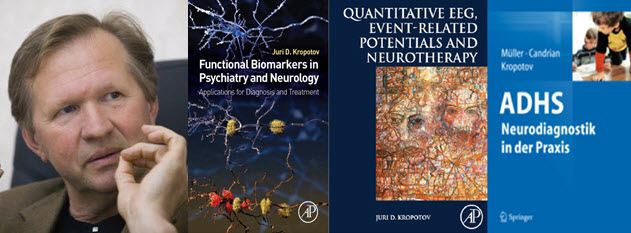4-day workshop with with a world renowned neuroscientist
Date: 22-25 of April 2016Venue: Mercure Sydney
About the workshop and the presenter
Prof. Yury Kropotov is a world renowned neuroscientist and a leading expert in the field of Quantitative Electroencephalography and Event Related Potentials. The unique methodology developed in his laboratory at the Human Brain Institute in St Petersburg (Russia) allows a sophisticated analysis of brain electric activity in resting states and under task conditions. These precise measurements of brain function then can be used in the clinical context to evaluate brain health in different psychiatric and neurological disorders. Prof. Kropotov has now finalised his second book, which is dedicated to functional neuromarkers in mental health and it is expected to be published by Elsevier in 2016. In this workshop Prof. Yury Kropotov will provide his distinct perspectives on the application of brain science to mental health based on decades of his experience in research and teaching. QEEG and ERP methodology is one of the most well validated and affordable diagnostic solutions for clinical practice and research. Event Related Potentials are considered to be a gold standard in psychophysiology. Using ERPs in conjunction with QEEG Brain mapping significantly increases reliability of diagnosis of mental disorders and, therefore, more personalised therapeutic interventions including pharmacotherapy and neuromodulation. This is why mental health professionals are increasingly turning to neuroscience for a better understanding of the brain. Whilst mainstream mental health tends to be practiced in a predominantly categorical way, based primarily on surface clinical symptoms, recent advances in neuroscience are providing much deeper insights into the brain dynamics that determine the neurobiological underpinnings of brain dysregulation and the efficacy of psychological function.This methodology is successfully used in Psychology, Psychiatry, Neurology, Forensic sciences, as well as academic brain research.
If you are involved in mental health field please come and learn about more precise, personalised and neuroscience based approaches to mental & brain health on this hands-on workshop.
Read what people say about Prof. Yury Kropotov workshops and methodology: Testimonials
Download the updated brochure for this workshop:
The workshop program
Day 1. Functional neuromarkers of brain self-regulation (QEEG)
- Concept of neuromarker and its relation to concepts of biomarker and endophenotype
- Steps of introducing neuromarkers into clinical practice
- Sources of neuromarkers: psychometrics and neuropsychological assessment, fMRI and PET, EEG and ERPs.
- Slow and infra-slow oscillations in fMRI and electrophysiology.
- Mechanisms of generation of alpha, beta and theta EEG rhythms
- Blind source separation in EEG
- Visualization methods in EEG/ERP: LORETA and sLORETA.
- Test-retest reliability of QEEG parameters
- Heritability of QEEG parameters
- Age dependence of QEEG parameters
- Summary and examples of clinical application in ADHD and autistic spectrum disorders.
Day 2. Functional neuromarkers of information flow within the brain.
- Neuroscience of information flow within the brain.
- Event Related Potentials (ERPs) as indexes of information flow.
- Conventional ERP waves in clinical practice: P300, N170, MMN.
- Blind source separation methods for extracting ERP latent components
- Functional meaning of ERP components of sensory processing and cognitive control.
- Visualization methods in ERP: LORETA and sLORETA.
- Test-retest reliability of ERP parameters
- Heritability of ERP parameters
- Age dependence of ERP parameters.
- Sensory and attentional systems and their functional indexes. Dyslexia and autism.
- ERP components of the Executive system. ADHD and schizophrenia
- Affective system and its functional neuromarkers. Depression.
- Stress system and its relation to anxiety and PTSD.
- Memory systems of the brain and their dysfunction in dementia.
- Functional neuromarkers of stroke and traumatic brain injury.
Day 3. Neuromodulation techniques in clinical practice
- LORETA/Tomographic NF
- Transcranial Alternative Current stimulation (tACS)
- Transcranial Direct Current Stimulation (tDCS)
- Neurofeedback in conventional EEG bands and in infra slow frequency band.
- Examples of constructing protocols of neurofeedback
- Examples of construction protocols of tDCS
Day 4. Master class
- Steps in QEEG/ERP assessment.
- What hypotheses can be formulated and answered.
- How a method of neurotherapy can be selected.
- How a protocol of neuromodulation can be constructed.
- How the results of treatment can be assessed.
- The cases in child and adult psychiatry, neurology, insurance practice will be presented.
- The recording of a subject from the class will be made, the QEEG/ERP will be assessed, and recommendations for peak performance will be constructed.
We encourage you to bring your EEG/ERPs recording if you like them to be analysed by Prof. Yury Kropotov at the workshop
Register now
Functional Neuromarkers in Mental Health workshop
For all enquirers please call +61 755992220
or email Rustam Yumash info@mindmatters.com.au

